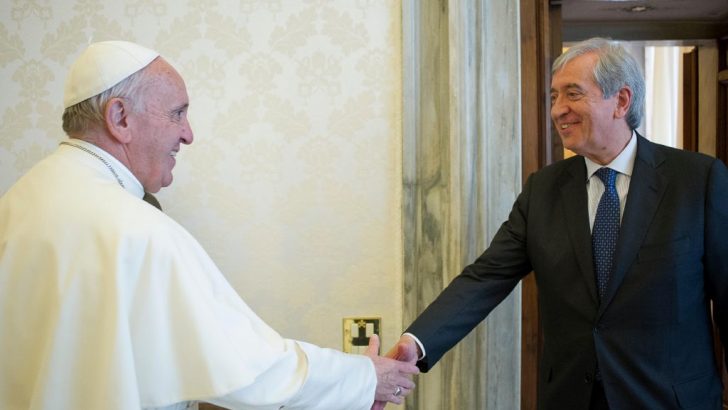In a new interview, Libero Milone, the lay Italian financial expert who was named the Vatican’s first-ever Auditor General in 2015 and who resigned under murky circumstances two years later, asserts that a Vatican criminal investigation against him has ended with no charges being filed.
Speaking to the Italian state TV network RAI, Milone said his lawyers were informed by the Vatican’s magistrate that the case has been archiviato, effectively meaning that it’s over.
So far the Vatican hasn’t issued any comment, which, in effect, amounts to a round-about confirmation, since if Milone’s claim that the case is closed were false, presumably a spokesman would want to correct the record.
News that the Milone affair apparently has ended with a whimper rather than a bang can’t help but seem a bit curious, given the seriousness of the charges that were hurled at the time Milone left.
After his resignation in June 2017, Milone broke his silence three months later in an interview in which he insisted that he hadn’t quit voluntarily but had been threatened with arrest by Vatican gendarmes on the basis of what he called “pre-fabricated” charges, and he said he was forced to sign a prepared resignation letter.
“Evidently, they didn’t want me to report some things I’d seen,” Milone said, implying he was brought down by enemies of transparency and financial reform.
Irregularity
Milone said that he was presented with two receipts for roughly €28,000 from the same company, suggesting he was involved in some sort of financial irregularity. He claims, however, that the signature on one of the documents wasn’t his, even though both carried the seal of his office.
What’s more interesting is what the money was for: having his office inspected and cleaned of bugging devices, as Milone is convinced he was being spied on. Conversely, he was informed during his interrogation by the gendarmes that he was suspected of spying on others in the Vatican illegitimately.
That charge was made public by then-Archbishop Giovanni Becciu, at the time the Pope’s ‘substitute’, or chief of staff. Becciu was recently made a cardinal by Pope Francis and is now the head of the Vatican’s Congregation for the Causes of Saints.
“He went against all the rules and was spying on the private lives of his superiors and staff, including me,” Becciu told Reuters, speaking of Milone.
Those are clearly serious charges, which therefore raises the question of what to make of the fact that the Vatican apparently has decided not to proceed with a criminal trial. (Such trials, by the way, have become routine over the last several months, making it even more puzzling why prosecutors decided to give this one a miss.)
Logically speaking, there are only a handful of possible explanations.
The first is that upon examination, investigators determined that the charges against Milone are false. If so, then seemingly he’d be entitled either to have his job back or to financial compensation. If neither of those things is forthcoming, it would suggest that from the Vatican’s point of view, this is something less than a clean bill of health.
The second possibility is that prosecutors believe Milone is guilty, but they’re concerned they wouldn’t be able to prove it at trial. That’s possible, although given the way rules of procedure in Vatican criminal trials tend to favour the prosecution, one wonders what the basis for such a concern might be.
A third possibility is that the decision not to move ahead is political rather than evidentiary – that whatever the truth of the matter, the greater good in this case is served by letting sleeping dogs lie. If that’s the reality, what’s unclear is what exactly that ‘greater good’ might be, and why it outweighs getting to the bottom of the implosion of what was supposed to be a lynchpin of the Pope’s overall financial reform.
Finally, a fourth possibility is that someone in the system with the power to influence which charges come forward and which drop by the wayside wanted this case to go away, presumably on the basis of vested personal interests. Of course, that too would leave open the question of what those interests might be.
At this point, it’s impossible to determine which of those four scenarios, if any, is closest to the truth, or whether elements of all of them are actually in the mix.
Transparency
What is clear, however, is that at a time when Francis is attempting to move the Vatican in the direction of greater transparency and accountability on multiple fronts, here we have a case in which serious charges of misconduct and abuse of power have been exchanged, yet a year after they surfaced, an investigation is apparently being allowed to expire quietly with no public explanation.
Further, Milone’s reputation has been badly damaged by the fallout from his ouster, which is either entirely justified if he’s guilty or a serious injustice if he’s innocent. Without closure in either direction, it seems he’s fated for a sort of professional limbo, never actually indicted but not quite exonerated either.
Ironically, a man who was hired to inject transparency into the Vatican’s operations is leaving under a cloud of obscurity. Whatever else one might think about that, it would, at least, seem to suggest that the spirit of full disclosure which was the original point of the whole reform is still, sometimes, more honoured in the breach than the observance.
John L. Allen Jr. is the Editor of Cruxnow.com


 John L. Allen Jr.
John L. Allen Jr. Pope Francis meets Libero Milone, former Vatican auditor general, at the Vatican in 2016. Photo: CNS
Pope Francis meets Libero Milone, former Vatican auditor general, at the Vatican in 2016. Photo: CNS 